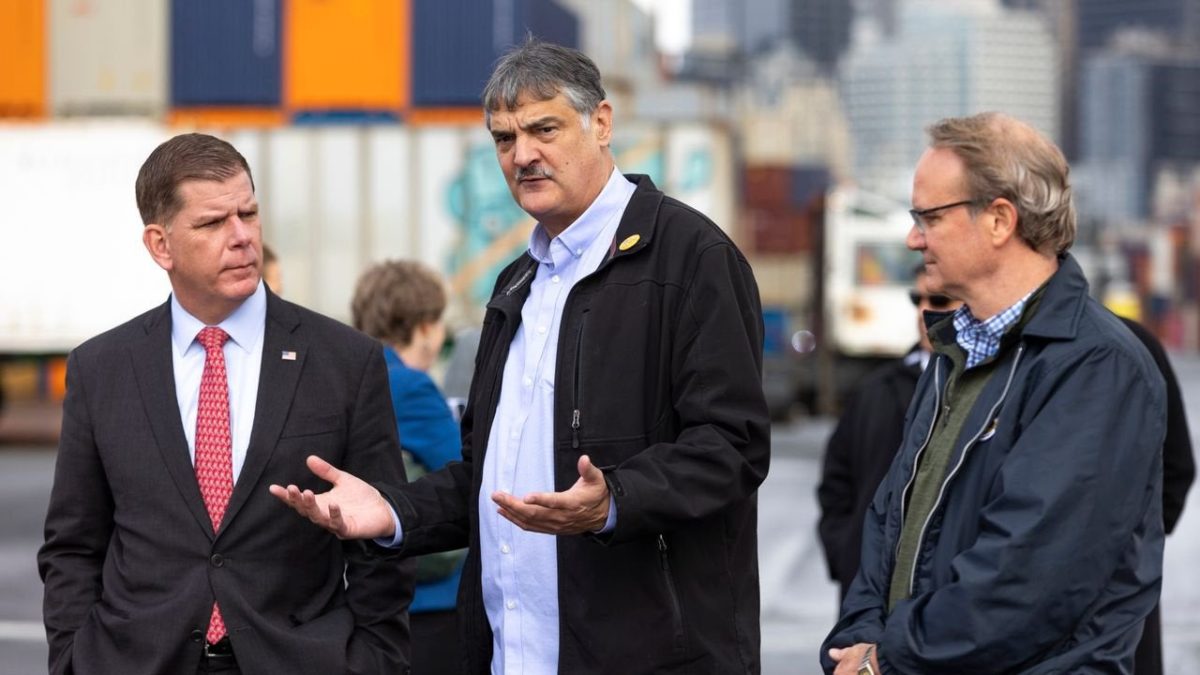
Thursday will mark the beginning of the third month since the expiration of the contract for 22,000 West Coast dockworkers. The International Longshore and Warehouse Union (ILWU) bureaucracy has kept workers on the job without a contract, in collusion with both the Pacific Maritime Association (PMA) and the Biden administration, which is determined to avoid disruptions in the supply chain at all costs. However, there are growing signs that contract talks, which have taken place under conditions of near-total secrecy, have stalled, and frustration is mounting among dockworkers.
Contract negotiations at West Coast ports have a history of slowdowns, strikes and lockouts, and government intervention. In 2002, negotiations deteriorated to the point where the PMA carried out a 10-day lockout that prompted the George W. Bush administration to intervene. In 2014 and 2015, the Obama administration also got involved to end a series of slowdowns and suppress local strikes.
The ILWU has been conspiring with the Biden administration for nearly a year now to prevent any work stoppage that would threaten the supply chain and to maintain the port operators’ profits.
In an August 29 tweet, the ILWU complimented itself for its services rendered: “Great work, #ILWU Local 21! The Port of Longview, Washington, ‘continued its record-breaking income streak’ during tough #pandemic times and #supplychain issues, according to numbers from port leadership.”
But the suppression of the dockworkers’ struggle is being challenged by the global resurgence of the class struggle. Millions of workers around the world have taken part in strikes and protests in recent months, including nationwide rail strikes in Britain, dockworker strikes in Britain, Germany and Greece and trucker strikes in South Korea. In the US, railroaders are pushing for strike action, while the railroad unions are preparing a new sellout contract. A strike at either the West Coast docks or the railroads could fatally undermine the attempts by the union in the other industry to keep workers on the job.
On July 18th, Oakland dockworkers refused to cross the picket line of owner-operator truck drivers who were protesting a new state law, AB5, which governs independent contractors. Thus they shut down the operations at all three terminals for a number of days, before the port operators were able to disperse the protests through threats of police action. The City of Oakland and the ports, with the tacit support of the ILWU, which accused the truckers of endangering public safety, then attempted to obtain an injunction against further protests. On Monday, a federal court officially lifted the injunction on AB5 taking effect in the trucking sector, setting the stage for a massive restructuring which could potentially force tens of thousands of independent truckers out of business.
Last week, in the Ports of Los Angeles and Long Beach, ILWU Local 13 officials shut down part of the ongoing automation of the port, one worker informed the WSWS. The union’s position is that the Platform and K-rails, part of a project to increase the use of rail in the unloading of cargo, are unsafe in their current location and need to be relocated. According to the report, workers were sent home. This report has not yet been independently confirmed by the WSWS.
“The business agent will be there today [for the night shift and tell people to stand by],” the worker said. “Pass the word. Sh–t’s about to get real! Contract negotiations have agreed on nothing. The employers want an extension on their terms! The delegates [of Local 13] will meet first week of October to call a strike vote.”
However, if this report is accurate, the postponement of a strike vote to October would only serve the purpose of isolating dockworkers and giving the port operators time to prepare. A hundred thousand railroad workers may strike as early as September 15, when a 30-day cooling-off period expires. Railroaders in the US are furious about their unions’ attempt to ram through the rotten deal prescribed by the Biden administration and are expected to strike after September 15 (at the end of the “cooling-off” period imposed by Biden’s appointed Presidential Emergency Board), when joint strike action with dockworkers would unleash enormous power.
This is precisely what the ILWU is determined to avoid. At any rate, nothing official has yet been announced…
Read the rest of the article here
